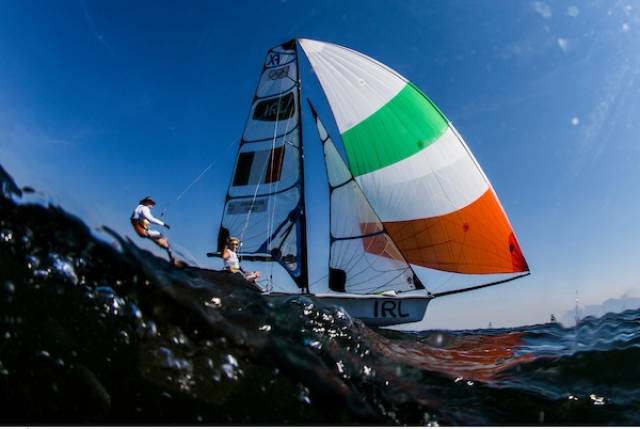The Olympic Sailing Competition rose to a dramatic crescendo, with the home nation winning a gold medal in the Women's Skiff by the most ridiculously small margin, just two seconds. Silver would have been great, but gold for Brazil has set off a party that will last for days. Ireland's Andrea Brewster and Saskia Tidey finished 12th overall from 20 at their first Olympics.
After no wind the previous afternoon, the final day delivered perfect 14-knot breezes for the finale. The four Medal Races kept the crowds on Flamengo Beach entertained all afternoon. It started with an ever-shifting battle for silver and bronze in the
Women's Skiff – 49erFX
The crowd on Flamengo Beach went wild as Martine Grael and Kahena Kunze (BRA) won gold by just two seconds from Alex Maloney and Molly Meech (NZL) in a nailbiting final run to the finish. New Zealand took silver and bronze went to Denmark's Jena Hansen and Katja Salskov-Iversen. The team to miss out on a medal from the four-way battle was the Spanish crew of Tamara Echegoyen and Berta Betanzos.
With the wind blowing 12 to 15 knots, New Zealand launched off the left-hand end of the start line, Brazil got away cleanly from the middle while Denmark and Spain made messy starts on the right. Maloney and Meech got into a good lead on the first lap but led Brazil by just 13 seconds at the halfway stage of the three-lap race. At the bottom gate, the Kiwis chose the right-hand side and Brazil broke off to the left in search of something different. When they came back together again at the top of the course, Brazil's alternative tactics had given them a ten-second lead.
Down the run to the finish the Kiwis attacked hard and made up ground on the Brazilians, but somehow Grael and Kunze held on to get across the line just two seconds ahead.
After five-time Olympic medallist Robert Scheidt just missed out on a sixth medal in the Laser, finishing an agonising fourth, it was critical that the Brazilian 49erFX team came away with something from the final race of Rio 2016. To come away with gold has sent their home nation into ecstasy. When Grael and Kunze won gold at the Olympic Test Event a year ago, the Brazilian media went wild. But one can only imagine how big this will go now that they have become Olympic Champions.
Grael's victory continues a great family tradition, her father Torben having won five Olympic medals for Brazil. Torben was watching from a coach boat and was one of the first to congratulate his daughter. Martine said, "To receive the medals here in Rio with all our friends and family is indescribable. But I didn't think about the fact the Brazilian sailing team had no medals. I was just focused on the race, nothing else.”
Kunze said, "Before starting the Medal Race we hugged each other and said, 'Let's give our best and no matter what the result it's going to be fine.' We were already happy to be among the first four teams, that was already an excellent result. And it's incredible to compete at home with these amazing fans. We hope to influence more girls to compete in sailing and to make our sport grow.”
Maloney and Meech so nearly made it a Kiwi double in the Skiff classes after Pete Burling and Blair Tuke had won gold in the Men's 49er. But any disappointment at missing 49erFX gold was swiftly cast aside as the Kiwi girls celebrated taking the silver. "It's an amazing evening for the Brazilian girls,” said Maloney. "I think the next couple of weeks will be pretty special for them.
With her brother Sam winning bronze two days earlier in the Laser Men's division, it's a double celebration for the Meech family. "I've really enjoyed it and it's been an amazing week,” said Molly. "We've sailed really well and were really happy with the way things have gone this week. The Olympics has been an amazing experience. It's awesome to have all the support back home and everyone getting up early to watch us race, it's really cool. The whole of the New Zealand sailing team has been working really hard for the last four years and I think that it's all paid off for everyone. It's amazing to be part of the team.”
Hansen and Salskov-Iversen beat the Spanish in the battle for bronze. The 49erFX was expected to deliver some of the most exciting and unpredictable racing at Rio 2016, but no one could have imagined that the gold would come down to the last two seconds.





























































